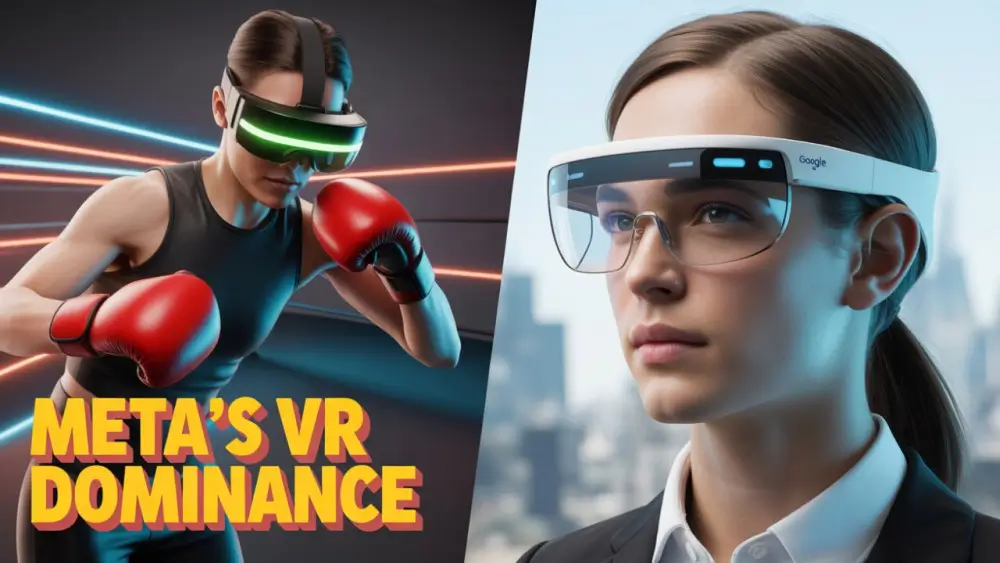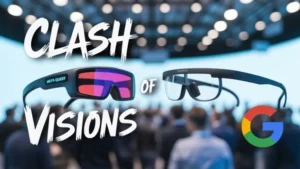As we step into the next computing frontier, virtual glasses are rapidly evolving from sci-fi dreams into practical tools reshaping how we work, interact, and experience the world. Google and Meta are at the forefront of this transformation, each with distinct approaches and visions that will influence users and businesses alike. Here’s a comprehensive comparison of their virtual glasses, the future they promise, and the opportunities and challenges they present.
Google’s Virtual Glasses: Practical, AI-Powered, and Stylish
One of the standout innovations from Google’s recent launches is Android XR, featuring AR (Augmented Reality) glasses developed in partnership with Samsung. Unlike bulky VR headsets, Google’s AR glasses are designed to be lightweight, discreet, and practical – looking like normal spectacles but packed with AI capabilities.

Key Features:
- Seamless AI Integration: Voice-based, natural interactions powered by Google’s Gemini AI. You can ask your glasses for information, send emails, or even order food without a phone or computer.
- Real-World Utility: The glasses overlay digital info on the environment, such as projecting restaurant locations nearby or providing contextual assistance during daily tasks.
- Design & Accessibility: Partnering with Wipaka, Google offers stylish, handcrafted frames made from wood, metal, or hybrid materials, blending fashion with function. This appeals to different lifestyles and preferences.
- Tiered Market Strategy: Expect options from affordable basic models ($50-$100) to mid-range professional glasses, up to premium $1,000+ versions for executives and influencers. Just like smartphones, status and style will play a big role.
- Professional Use Cases: Perfect for attending meetings, research, or productivity on the go, transforming glasses into extensions of work and communication.
Opportunities & Ethical Considerations
- New markets will emerge for opticians, frame makers, accessories, and AI-enhanced eyewear.
- Investors and entrepreneurs can capitalize on hardware and software ecosystems.
- Social questions arise around isolation, real-life relationships, and how humans engage with AI – raising important debates on the balance between immersion and authentic connection.
Meta’s Virtual Glasses: Immersive, Social, and Metaverse-Driven

Meta’s virtual glasses focus on augmented and virtual reality experiences, heavily tied to their vision of the metaverse – a shared digital space for socializing, entertainment, and work.
Key Features:
- Immersive Social Interaction: Overlay avatars, interact with virtual objects, and communicate in augmented reality.
- Metaverse Integration: Meta glasses are gateways to virtual meetings, gaming, fitness, and social experiences inside the metaverse.
- Developer Ecosystem: Meta supports app development for immersive entertainment and interactive environments.
- Consumer & Lifestyle Focus: Designed for social connection and immersive media consumption, emphasizing lifestyle and entertainment over professional productivity.
Head-to-Head: Google vs Meta
| Aspect | Google AR Glasses | Meta Virtual Glasses |
| Primary Focus | Practical AI assistant, productivity | Immersive social experiences, metaverse |
| Design | Lightweight, stylish, everyday frames | Bulkier AR/VR designs for immersion |
| AI Integration | Deep integration with Google AI ecosystem | Focus on AR social apps, less AI-driven |
| User Experience | Natural voice commands, contextual info | Avatar interaction, virtual spaces |
| Market Strategy | Tiered pricing from basic to premium | Focus on high-end immersive devices |
| Business Use | Professional productivity, tourism, education | Virtual events, social engagement, entertainment |
What This Means for Businesses
- Google’s glasses offer real-time AI assistance for professionals, educators, and tourists – improving productivity and decision-making on the go without the need for screens or keyboards.
- Meta’s glasses revolutionize collaboration and customer engagement through immersive virtual meetings, branded experiences, and interactive marketing within the metaverse.
Business Benefits:
- Enhanced efficiency and mobility for teams
- New immersive marketing and customer interaction channels
- Cost savings in training, travel, and events
- Opportunities to innovate in education, healthcare, and retail
The Future of Wearable Computing
Despite concerns about social isolation and over-automation, the evolution from desktops to laptops, smartphones, and now smart glasses seems inevitable. The choice for users and businesses will boil down to preference, lifestyle, and adaptability.
Those who balance authentic human connection with the power of hyper-automation will become increasingly valuable in this AI-driven world. For businesses, embracing these new wearable technologies early will unlock creativity, efficiency, and new ways to engage audiences in a rapidly changing digital landscape.





